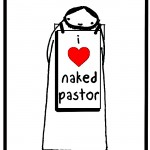In a TIME interview, the Dalai Lama was asked, “How do you stay so optimistic and faithful when there is so much hate in the world?” He responded:
I always look at any event from a wider angle. There’s always some problem, some killing, some murder or terrorist act or scandal everywhere, every day. But if you think the whole world is like that, you’re wrong. Out of 6 billion humans, the trouble-makers are just a handful.
I would suppose that the Dalai Lama would base this conclusion of his on his observations. He can say this, even after having suffered persecution and exile. But I would also suggest that he reaches this conclusion because it is one of his basic tenants that people aren’t essentially evil but good.
This reminded me of my recent trip to Haiti. I became friends with Doug Pagitt. We were talking one day about the film The Book of Eli. After being exposed to such devastation and squalor, I said to Doug, “You know in The Book of Eli, like a lot of these post-apocalyptic films, where there is no order and everyone is raping and stealing and no one can be trusted… just complete anarchy and cruelty and fear? I don’t see that here. In a situation where there could be the post-apocalyptic scenario depicted in all these films, it isn’t occurring. All the people we see and meet and speak with are kind, gentle and open.” There were only one or two places where I didn’t feel safe. Doug agreed. This isn’t to say there aren’t rapes and theft and fear. Indeed these things are occurring on an increased scale and more security is needed. But it is not happening at the level unleashed fear-mongering would like to depict. It might lead me to suspect that people aren’t essentially evil but good.
I have been heavily influenced, and gladly, by Reformed Theology. Karl Barth is definitely one of my heroes. Throughout his theological career he emphasized the sinfulness of man and the sovereignty of God. No to man and Yes to God. But even Barth, near the end of his life, wished he’d emphasized more of the Yes to man. He eventually saw, embedded in his own theology, that Jesus’ Amen to God and God’s Yes to Jesus was man’s Amen to God and God’s Yes to man. Barth, days before he died, wrote to his theological nemesis Emil Brunner and said,
If he is still alive and it is possible, tell him again, ‘Commended to our God,’ even by me. And tell him, Yes, that the time when I thought that I had to say ‘No” to him is now long past, since we all live only by virtue of the fact that a great and merciful God says his gracious Yes to all of us.’
These were the last words Brunner heard in his life.
Remember the reflections I wrote on The Lucifer Effect? Dr. Zimbardo writes:
Ordinary people, even good ones, can be seduced, recruited, initiated into behaving in evil ways under the sway of powerful systemic and situational forces.
This might lend itself to the support of some who see human beings as essentially evil. I might’ve agreed. Not anymore. These three scenarios:
- the Dalai Lama‘s and the Tibetan people’s plight;
- Karl Barth‘s stubborn ‘No!’ to man throughout almost all of his theological career;
- Zimbardo‘s famous Stanford Experiment labelled The Lucifer Effect…
In each of these scenarios they challenge the abuse of position, privilege and power. I will quote Zimbardo again:
I vowed to use whatever power that I had for good and against evil, to promote what is best in people, to work to free people from their self-imposed prisons, and to work against systems that pervert the promise of human happiness and justice.
Would not Barth, the Dalai Lama, and even God say the same?















